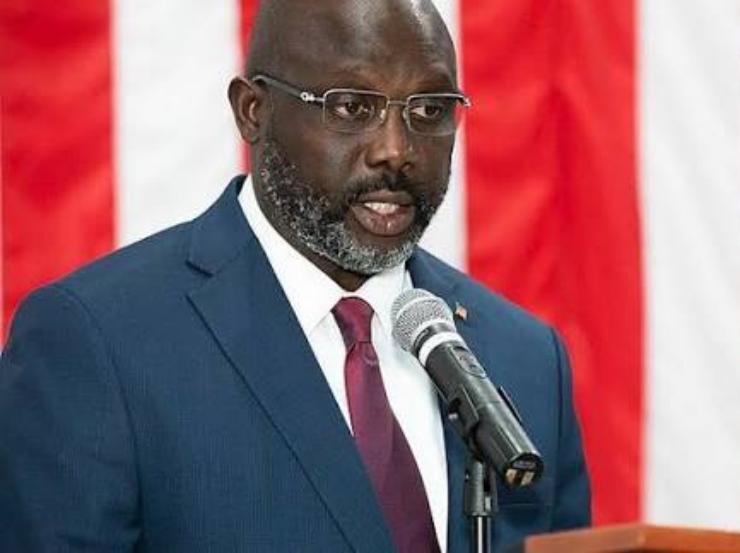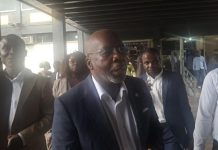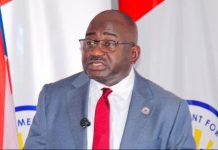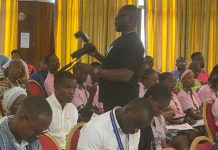Africa-Press – Liberia. The CDC accused the administration of pursuing fiscal priorities that do not reflect the struggles of the population and argued that Liberia cannot endure another year of what it called misplaced priorities./CDC Political Leader former President George M Weah.
The Government of Liberia has issued a response to the Coalition for Democratic Change (CDC) following a recent statement in which the opposition accused the administration of submitting a draft national budget that places the interests of officials above the needs of citizens.
The CDC had argued that the Fiscal Year 2026 Draft National Budget offered no meaningful relief to ordinary Liberians and claimed that the government was expanding discretionary spending in high offices while social services, youth initiatives, and community programs continued to suffer.
The party also questioned the credibility of the Ministry of Information’s earlier explanation of the budget, describing it as evasive and filled with what it called flawed legal reasoning.
According to the CDC, the draft budget fails to address the rising cost of living, declining public services, and worsening unemployment. The opposition cited low national performance figures in several human development indicators and claimed that budgetary increases for the offices of the Speaker and Deputy Speaker were unjustifiable at a time when many citizens lack access to adequate healthcare, education, and income opportunities.
The party accused the administration of pursuing fiscal priorities that do not reflect the struggles of the population and argued that Liberia cannot endure another year of what it called misplaced priorities.
In a counterstatement issued by the Ministry of Information, the government dismissed the CDC’s criticisms as misleading and without legal foundation. The Ministry said the opposition’s interpretation of the national budgeting process was inaccurate and ignored the clear provisions of the Public Financial Management Law.
It explained that once the Executive submits a draft budget, the authority to review, amend, and approve it lies entirely with the Legislature, not with the President.
The Ministry emphasized that jurisdiction over the budget shifts immediately to lawmakers upon submission, and the Executive does not possess the authority to withdraw or modify the document afterward.
According to the Ministry, this principle reflects established legal and constitutional procedures that guide the national budgeting process.
The Ministry of Information said the opposition’s interpretation of the national budgeting process was inaccurate and ignored the clear provisions of the Public Financial Management Law./UP Political leader President Joseph N. Boakai.
The government further addressed the CDC’s claims concerning debt servicing and argued that the opposition was attempting to obscure its own record of financial irregularities. The Ministry referenced findings from the General Auditing Commission, noting that the previous CDC-led government engaged in borrowing that violated established financial rules and left behind irregular debt obligations.
The Ministry said these actions contributed to fiscal instability and forced the current administration to restore order to the country’s public financial management systems. It stated that the government has since prioritized lawful debt payments, eliminated unauthorized borrowing practices, and created fiscal conditions that support investments in salaries, employment programs, and essential public services.
Responding to allegations that the revenue projections in the Fiscal Year 2026 budget are unrealistic, the Ministry said domestic revenue performance has improved steadily for two consecutive years, marking a major departure from the frequent budget recasts and shortfalls that characterized the CDC’s time in office.
The Ministry defended the inclusion of contingent revenue sources such as the ArcelorMittal Liberia signature bonus and proceeds from ongoing asset recovery operations. It explained that these sources follow long-standing budgetary precedents and are backed by negotiations and recovery efforts that are already underway.
The Ministry described the Fiscal Year 2026 draft budget as a disciplined and forward-looking financial plan that builds on tangible economic gains and improved public financial management systems. It said the budget reflects renewed confidence in government institutions and stands in clear contrast to what it described as the uncertainty and opacity that marked the previous administration’s financial operations. According to the Ministry, the progress made over the past two years is measurable and rooted in principles of transparency and accountability.
The government maintained that the public deserves accurate information about the budget and cautioned against what it called the CDC’s attempts to distort the national discourse. It reaffirmed its commitment to upholding the law, managing public resources responsibly, and advancing reforms that strengthen the economy and improve the delivery of services.
The Ministry said the Fiscal Year 2026 budget reflects national priorities designed to promote stability and development, not partisan interests, and called on the public to rely on facts rather than political misrepresentation.
CDC Takes Aim at MICAT
The CDC, in a counterstatement, sharply criticized the Ministry of Information’s defense of the FY2026 Draft National Budget, accusing the government of ignoring worsening economic conditions while expanding spending on top political offices.
In a statement issued Wednesday through Anderson Slober Chea, Deputy Secretary General for Press and Public Affairs, the CDC described the Ministry’s response as “deliberate disinformation” and argued that the budget fails to address the daily realities faced by ordinary Liberians.
According to the CDC, the Ministry of Information’s statement devoted considerable space to attacking the opposition but “remained silent on rising prices, collapsing public services, growing unemployment, and the widening gap between officials and citizens.”s
The party argued that after nearly two years of controlling the national budget, the administration of President Joseph Nyuma Boakai has failed to deliver improvements in key human-development areas. The party referenced figures from the latest U.S. State Department report, citing Liberia’s performance in employment opportunities (9%), girls’ primary education completion (25%), child health (36%), civil liberties (27%), government effectiveness (33%), and access to justice (44%).
“These are not mere statistics, they represent the lived struggles of Liberian families,” the statement said, adding that a government overseeing such indicators should be explaining declining conditions rather than “celebrating technical budget debates.”
For More News And Analysis About Liberia Follow Africa-Press






